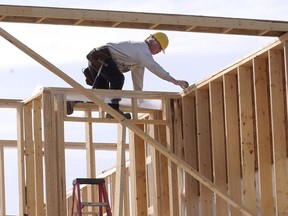Federal rule to unlock billions could help get rid of N.B. NIMBYism: planner
The Trudeau government wants provinces to override municipal laws to allow up to four housing units to be built on one residential property

Article content
A federal requirement to unlock billions in cash for provinces and municipalities could help get rid of NIMBYism in New Brunswick, says a regional service commission planner.
The Trudeau government wants provinces to override municipal laws to allow up to four housing units to be built on one residential property without the need for municipal rezoning.
It’s a move Prime Minister Justin Trudeau doubled down on Wednesday, stating provinces must agree to get their cut of a new $6-billion fund, or the feds will go around them and give money directly to municipalities that want to comply.
That doesn’t seem like much of a problem in New Brunswick.
Moncton, Fredericton, and Saint John, as well as several other communities, have already promised to make the zoning bylaw changes to unlock other buckets of federal cash.
Meanwhile, Xander Gopen, senior planner with the Southwest New Brunswick Service Commission, says a more prescriptive approach from the provincial government could cut down on “Not In My Back Yard” or NIMBY protests to new development with fewer public hearings on rezoning.
“Rezoning for something that’s right next to you, that’s when we tend to get more public feedback on things,” Gopen said.
“So I can definitely understand municipalities and all local governments saying ‘if we can just skip that step that would make municipal administration easier, it would save a lot of time,’ because the process could add three or four months.”
It’s a reason housing is slow to get built, he added.
“Every discretionary approval that you add, whether that’s a variance or rezoning, that’s the opportunity for that decision-making body to say ‘no,’” Gopen said.
“These are typically public and these are elected officials and their job is to listen to the public.”
But that’s not helping alleviate a housing crisis.
“One of the reasons why planners have pushed this idea for a long time is because we’re supposed to work in the public interest,” Gopen said. “The public is broader than who just shows up for a meeting or writes a letter.
“Are you hearing from the people who are most in need of this housing?”
The federal condition to accept four units as-of-right and allow more “missing middle” housing, including duplexes, triplexes, townhouses and multi-unit apartments in order to receive new infrastructure and housing money has been met with opposition.
Ontario Premier Doug Ford has railed against allowing four-unit buildings across the province, saying he won’t tell cities what to do.
But several New Brunswick communities have already promised to make that move to unlock other federal dollars.
“As a condition of securing Housing Accelerator Fund payments, successful municipalities in New Brunswick and across the country must commit to amending their zoning regulations in the next three years to allow four residential units as-of-right in areas designated for residential development,” said Andrew Smith, president of the New Brunswick Association of Planners.
“Moncton, Fredericton, and Saint John, for example, have committed in-principle to making these changes.”
The feds also have accelerator fund agreements in New Brunswick with Bathurst, Tracadie, Campbellton, Fredericton, and nine other smaller communities in the province.
But Smith continued that “municipalities are creatures of provincial statute,” agreeing with Gopen that a blanket policy could see results.
Gopen, whose service commission includes St. Stephen, Saint Andrews, and the Village of McAdam, said it’s also doable in most small municipalities in New Brunswick as they typically have extra water and sewer service capacity available.
“It does need to have a local understanding of ‘where can we do this, is there service capacity there?’” he said.
Lot sizes and neighbourhood characteristics are other considerations, Gopen said.
It’s unclear whether the Higgs government will adopt the federal government’s request.
On Tuesday, Higgs criticized Ottawa putting conditions on the money, although while leaving the door open to reaching a deal.
Meanwhile, speaking in Toronto on Wednesday, Trudeau doubled down on attaching strings to the new federal money.
“We’re going to continue to work with those municipalities that want to work with us with $6 billion worth of infrastructure investments to allow more housing to get built,” Trudeau said.
“We would love to do that right across the province, but if the province doesn’t want to step up with ambition on building the infrastructure needed to support more housing, we’ll do it specifically with willing partners.”












Postmedia is committed to maintaining a lively but civil forum for discussion. Please keep comments relevant and respectful. Comments may take up to an hour to appear on the site. You will receive an email if there is a reply to your comment, an update to a thread you follow or if a user you follow comments. Visit our Community Guidelines for more information.